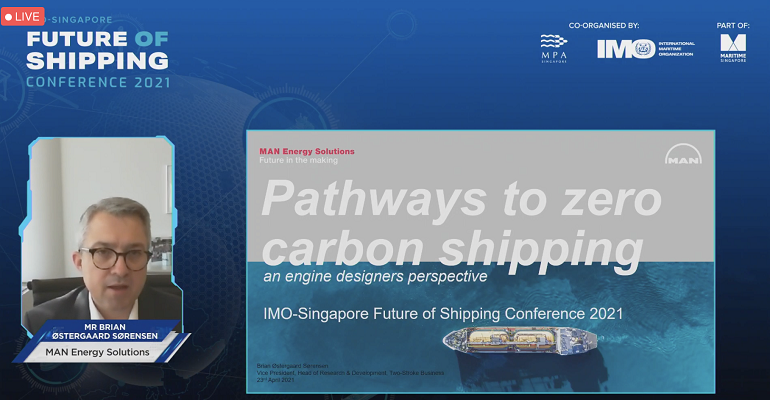Brian Østergaard Sørensen, Vice President, Head of Research & Development, Two-Stroke, MAN Energy Solutions discussed the available solutions for a pathway to decarbonisation at the IMO-Singapore Future of Shipping Conference on 23 April. The online conference was the final event in Singapore Maritime Week.
Sørensen examined both currently available solutions such as LNG, as well as potential future fuels such as ammonia and hydrogen, which are still under development.
“Some of the future fuels that have been mentioned such as methanol, ammonia, and hydrogen carry some inherent challenges either how we produce them, how do we make them available at scale or do we actually handle them onboard,” he said.
While production of hydrogen and the engine might not be significantly higher than conventional solutions handling and storage could be a different story. “Hydrogen requires quite high costs of handling….handling and storing onboard as a solution for deepsea shipping is challenging and see there could be large costs involved in that.”
While LNG as marine fuel has seen some recent controversy following a World Bank report that recommended against it, MAN joins the likes of Shell and SEA\LNG backing it is a near-term solution for shipping with a pathway to decarbonise.
“Looking at some of the other alternative solutions like LNG or synthetic LNG there are different pathways toward carbon neutrality. But I think here the beauty with some of the fuel that is you could start off with a fossil based fuel today and then you could gradually drop in the green part and that actually provides a viable transition pathway for a shipowner,” Sørensen explained.
“So, investing today you would actually be able to secure the future of your asset.”
MAN sees dual fuel technology gaining momentum with it accounting for around 35% of engine orders placed with the company today.
“LNG is the dominant fuel type that is on the market, or is currently on order. Methanol, ethane and LPG are all out there in certain quantities. Today we have 1.7m running hours these fuel types are industry established technologies.” Sørensen said all these fuel types were workable and scalable.
Looking to the next phase of decarbonisation, he said, “If you start to drop in synthetic methane that is one pathway to carbon neutrality or you could start to retrofit the engine to methanol or ammonia, so it will give you some choices down the road.”
Copyright © 2024. All rights reserved. Seatrade, a trading name of Informa Markets (UK) Limited.
Add Seatrade Maritime News to your Google News feed.  |


